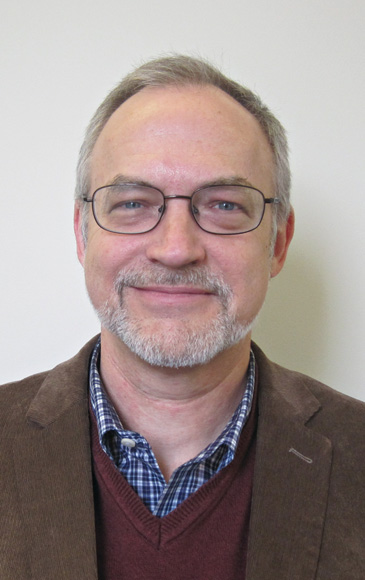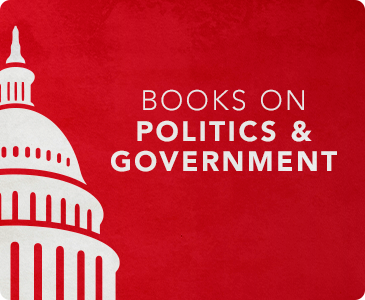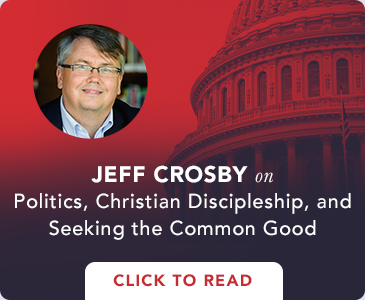A Conversation on American Democracy with Robert Tracy McKenzie
In his book We the Fallen People, historian Robert Tracy McKenzie takes an unflinching look at the nature of democracy throughout American history. In this interview, he explores the current polarized political climate, our interpretation of the Founders' theology (or better yet—their anthropology), and how our view of human nature has impacted American democratic thought. Read more in this press release.
What led to your interest in democracy and now sharing about it in the context of political polarization?
Robert Tracy McKenzie: We the Fallen People reflects my deep concern for the future of American democracy and even greater concern for the public testimony of American Christians. The political polarization that engulfs us poses a dire challenge to both. My ultimate goal is not to make a political statement but rather to help Christians think Christianly about democracy. We must think Christianly before we can act faithfully, and as we do so, both the witness of the church and the stability of our political institutions will benefit.
My ultimate goal is not to make a political statement but rather to help Christians think Christianly about democracy.
What is your main thesis in We the Fallen People?
McKenzie: That over time Americans have largely embraced democracy for the wrong reason. As C. S. Lewis argued long ago, there are really only two basic reasons to endorse majority rule: The first is because you have confidence in human nature. The second is because you don't. The former is what Lewis called the "false, romantic" understanding of democracy, and yet it's the understanding that most Americans, including most American Christians, adopted long ago.
With Lewis, I contend that a deep appreciation of human sinfulness must be the starting point of our thinking about democracy. Our failure to start there both worsens our malfunctioning political system and intensifies the polarization that so bitterly divides us. Part of the problem of American democracy, in other words, is that we Americans think too highly of ourselves. Part of the solution, I suggest, is consciously to redefine ourselves as "We the Fallen People."
What do you hope your book contributes to the present dialogue on democracy?
McKenzie: To begin with, I hope it makes us more aware of the implicit assumptions about human nature that not only inform how and why we defend democracy but also explain why we can grow so impatient with it. Our Founding Fathers assumed that no form of government could flourish that was predicated on a false understanding of human nature. We need to recover their sense of urgency in this regard.
By starting with a focus on the Founders, We the Fallen People can remind readers that there is an alternative to the path we have chosen, that it is entirely possible to champion majority rule without turning a blind eye to human sinfulness. Indeed, the Founders would persuade us that a healthy appreciation of our fallenness is essential to a flourishing democracy and vital to the long-run preservation of our liberty.
At a time when populism pervades American politics, We the Fallen People should help readers in thinking both historically and Christianly about that powerful phenomenon. I dive deeply into the presidency of our first populist president, Andrew Jackson, and draw lessons from that era for our own moment in history. Although populist rhetoric can be effective at calling attention to real injustices in our society, too often at the heart of the populist message are assertions that weaken democracy and, more critically, contradict biblical truth.
The Founders would persuade us that a healthy appreciation of our fallenness is essential to a flourishing democracy and vital to the long-run preservation of our liberty.
How do you understand the relationship between Christianity and the American Founding Fathers?
McKenzie: I think Christians have devoted too much attention to the question of whether the Founders were individuals of authentic, personal Christian faith. Caught up in the culture wars, we have been determined to prove that they were Christian men, guided by Christian principles with the goal of founding a Christian country. In We the Fallen People I turn our attention from the Founders' theology to their anthropology, from what they thought about God to what they thought about us. And their view was unequivocal: although they rarely used the term original sin, they held a view of human nature that accorded closely with that orthodox Christian doctrine, the belief that we come into the world as fallen beings who want nothing so much as to rule and please ourselves. Within a couple of generations that understanding had been all but vanished from the public square however, and American democracy ever since has rested on the more comforting, though unbiblical view, that we are individually good and collectively wise.
How has the critique of Alexis de Tocqueville contributed to our ideas about American democracy?
McKenzie: The answer, I'm afraid, is not very much, at least outside of scholarly circles. Tocqueville's Democracy in America is the most important book ever written on the topic, but it is far more often cited than read, and we're the poorer for it. His masterpiece is full of brilliant insights, but arguably the greatest is his recognition that democracy per se is morally indeterminate. It can lead to "servitude or liberty, enlightenment or barbarism." That's a sobering reminder we need to hear every day. Tocqueville also said much that we need to hear about the relation between Christianity and democracy. Writing two centuries ago, he credited American Christianity with restraining what he labeled "the tyranny of the majority," but he also warned that the church's positive influence would vanish when Christians began to ally themselves too closely to a particular political party or leader.
Where do you see the American political system in twenty years?
McKenzie: A wise historian never predicts the future, so I'll just share my fears and hopes.
My fears are twofold, and I'll state them bluntly: It's entirely conceivable that neither democracy nor Christianity will flourish in the United States in the future as they have in the past. The US is in the grips of a crisis of democracy fueled by a level of partisan polarization unequaled since the Civil War, and faith in our political institutions, and in democracy itself, is plummeting. At the same time, it seems likely that the political engagement of US Christians in the midst of this crisis of democracy—of white evangelicals, most especially—is mortgaging the long-run witness of the church in exchange for short-term influence. This is a tragic, catastrophic miscalculation. Polls indicate that the United States is undergoing head-spinning secularization, and it appears that the political witness of the church is only accelerating that trend.
It's entirely conceivable that neither democracy nor Christianity will flourish in the United States in the future as they have in the past.
My hopes, in comparison, are more modest: I believe that neither of these trends are inevitable and both can be reversed. In neither respect have we passed the point of no return. That point is looming on the horizon however, and time is running short.









